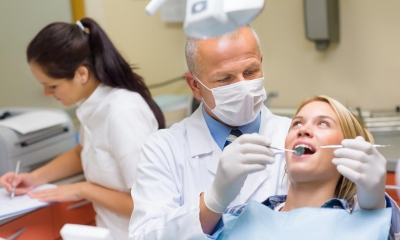
All dentists wishing to practise in the UK must be entered on the Register maintained by the General Dental Council (GDC) and must re-register each year. All dentists in England must be registered with the Care Quality Commission (CQC) as well.
The GDC is the statutory regulatory body for the dental profession and is responsible for overseeing professional standards. Dentists must take out professional indemnity insurance and must also participate in a statutory continuing professional development (CPD) scheme. The GDC requires dentists and dental care professionals to demonstrate that they can speak English well enough to practise safely.
Dental practices in Northern Ireland that offer private treatment must register with the Regulation and Quality Improvement Authority (RQIA). In Wales the Healthcare Inspectorate Wales (HIW) is the regulatory body. HIW inspects all dental practices (both NHS and private) at least once every three years.
Your dental practice should only employ, or work with, GDC-registered dental hygienists, therapists, nurses and technicians.
You should be aware that all dental practice websites must contain certain details about the practice, your qualifications and your GDC registration number. Contact the BDA for more information.
The use of the materials and the items of equipment commonly used in the dental practice is in many cases subject to regulation, for example:
- the Mercury Regulations place restrictions on the use of dental amalgam when treating young people or pregnant or breast feeding women. Dental amalgam must only be used in pre-dosed encapsulated form
- the Ionising Radiations Regulations and Ionising Radiation (Medical Exposure) Regulations regulate the use of x-ray equipment. Guidance Notes for Dental Practitioners on the Safe Use of X-ray Equipment can be accessed via the College of General Dentistry
- dental practices must have a written scheme of inspection and insurance cover against explosion for pressure vessels
- the use of class 3B or 4 dental lasers is regulated in some regions of the UK. Practices in Northern Ireland must register with the RQIA. The registering authority in Wales is the HIW. Registration with the CQC covers practices in England, and there is currently no requirement to register in Scotland
What licences does a dentist need?
You should be aware of the following:
- dentists wishing to practise in the UK must be registered with the General Dental Council (GDC) and must pay an annual retention fee
- dentists in England must register with the Care Quality Commission (CQC) and display the rating awarded following a performance assessment
- if you use dental lasers (class 3B or 4) you will need to register with the Regulation and Quality Improvement Authority (RQIA) in Northern Ireland and with the Healthcare Inspectorate Wales (HIW). There's currently no requirement to register in Scotland. In England, registration with the CQC covers the use of lasers
- practices in Northern Ireland providing private treatment must register with the RQIA
- practices in Wales offering any private treatment must register with HIW
- practices in Scotland offering only private treatment must register with Health Improvement Scotland
- dentists using x-ray generators must register with the Health and Safety Executive (HSE)
- anyone holding patient records must register with the Information Commissioner's Office (ICO) as a data user
- dental hygienists, therapists and technicians must be registered with the GDC. You should only employ - or work with - registered dental nurses and technicians, hygienists and therapists
- if you sell dental insurance you may need authorisation from the Financial Conduct Authority (FCA)
- you will need to obtain a Music Licence from PPL PRS Ltd if you plan to play background music in your practice
Storage, use and disposal of potentially hazardous substances
Specific regulations cover the use and storage of controlled drugs and substances such as mercury. You will also have a duty to ensure that controlled and hazardous waste is disposed of safely - for example, by using an authorised waste carrier. Contact your local authority environmental health department for guidance.
Health & Safety, fire
You must comply with workplace health and safety and fire safety legislation.
Employment legislation
Anyone employing staff must comply with employment legislation. Important areas of legislation include recruitment, employment contracts, pay, working hours, holidays, employment policies, sickness, maternity, paternity, discrimination, discipline, grievances, dismissals, redundancies and employment tribunals.
Insurance for a dentist
Contact an insurer or insurance broker and explain exactly how your business will operate - they will then explain what insurance cover you must have by law, and other cover you should consider. This might include:
- premises, equipment, fixtures and fittings, materials - including precious metals/alloys and drugs/medical stock
- income protection
- professional indemnity - GDC standards require dentists to "have appropriate arrangements in place for patients to seek compensation if they suffer harm"
- cash
- business interruption
- employer's liability
- public liability
- pressure vessel insurance
Shop around for a dental practice insurance package.


